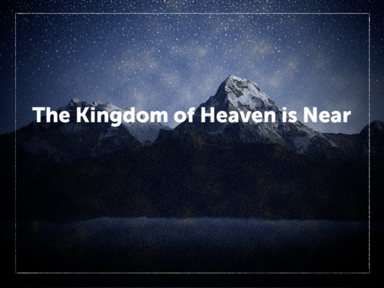The Kingdom of Heaven is Near

In those days John the Baptist appeared in the desert of Judea announcing, 2 “Change your hearts and lives! Here comes the kingdom of heaven!” 3 He was the one of whom Isaiah the prophet spoke when he said:
The voice of one shouting
in the wilderness,
“Prepare the way for the Lord;
make his paths straight.”e
4 John wore clothes made of camel’s hair, with a leather belt around his waist. He ate locusts and wild honey.
5 People from Jerusalem, throughout Judea, and all around the Jordan River came to him. 6 As they confessed their sins, he baptized them in the Jordan River. 7 Many Pharisees and Sadducees came to be baptized by John. He said to them, “You children of snakes! Who warned you to escape from the angry judgment that is coming soon? 8 Produce fruit that shows you have changed your hearts and lives. 9 And don’t even think about saying to yourselves, Abraham is our father. I tell you that God is able to raise up Abraham’s children from these stones. 10 The ax is already at the root of the trees. Therefore, every tree that doesn’t produce good fruit will be chopped down and tossed into the fire. 11 I baptize with water those of you who have changed your hearts and lives. The one who is coming after me is stronger than I am. I’m not worthy to carry his sandals. He will baptize you with the Holy Spirit and with fire. 12 The shovel he uses to sift the wheat from the husks is in his hands. He will clean out his threshing area and bring the wheat into his barn. But he will burn the husks with a fire that can’t be put out.”
Into the wilderness
The New Exodus
In those days John the Baptist appeared in the desert of Judea announcing
In those days John the Baptist appeared in the desert of Judea announcing
In those days John the Baptist appeared in the desert of Judea announcing
In such surroundings and under such circumstances a rugged preacher of righteousness was needed. John fitted the part, and his environment suited his message.
They tended to be wealthy and worldly, whereas the Pharisees were strict legalists in religion. Many of both parties were insincere, greedy, selfish impostors.
John’s message to the Pharisees and Sadducees was one of judgment. To call the most influential religious leaders of the time a brood of vipers—the offspring of snakes—was a direct attack. He challenged them to demonstrate actions in keeping with repentance. This was a call for them to turn from their regular religious activities to a genuine relationship of complete obedience to God. The call to produce fruit is a summons to right actions rather than just saying the right words. The lack of integrity between right words and right actions is a theme throughout Matthew’s gospel.
John’s message to the Pharisees and Sadducees was one of judgment. To call the most influential religious leaders of the time a brood of vipers—the offspring of snakes—was a direct attack. He challenged them to demonstrate actions in keeping with repentance. This was a call for them to turn from their regular religious activities to a genuine relationship of complete obedience to God. The call to produce fruit is a summons to right actions rather than just saying the right words. The lack of integrity between right words and right actions is a theme throughout Matthew’s gospel.
John’s message to the Pharisees and Sadducees was one of judgment. To call the most influential religious leaders of the time a brood of vipers—the offspring of snakes—was a direct attack. He challenged them to demonstrate actions in keeping with repentance. This was a call for them to turn from their regular religious activities to a genuine relationship of complete obedience to God. The call to produce fruit is a summons to right actions rather than just saying the right words. The lack of integrity between right words and right actions is a theme throughout Matthew’s gospel.
In the ancient Mediterranean many people thought of vipers as mother killers.* In the fifth century B.C. Herodotus declared that newborn Arabian vipers chewed their way out of their mothers’ wombs, killing their mothers in the process. Herodotus believed that they did so to avenge their fathers, who were slain by the mothers during procreation (Herod. Hist. 3.109). Later writers applied his words to serpents everywhere (Aelian On Animals 1.24; Pliny N.H. 10.170; Plut. Divine Vengeance 32, Mor. 567F). Calling John’s hearers vipers would have been an insult, but calling them a brood of vipers accused them of killing their own mothers, indicating the utmost moral depravity.
John the Baptist, the new Elijah
The biblical concept of repentance is sometimes confused with confession in the modern, evangelical church. However, the New Testament was under no such delusion. Repentance is not just saying you are sorry for your sins. It is the hard work of changing the direction and patterns of your life. Repentance is not feeling better because you got something off your chest; it is embarking on a new direction in life.
Produce fruit that shows you have changed your hearts and lives
Entering into Our Own Wilderness
The Greek word for repent means “change one’s mind.” Repentance is a change of attitude. It is not an emotional feeling but a moral purpose. It is a determined decision that one is done with sin, that he has renounced the world, the flesh, and the devil.
